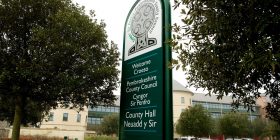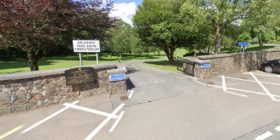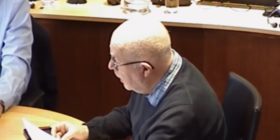Breaking down the barriers

Professor Karen Holford sets out initiatives to address critical shortage of women in science, technology, engineering and maths
A new report published today (8 March), and co-authored by Cardiff University’s Professor Karen Holford, has laid out a series of initiatives and recommendations aimed at encouraging and helping more women to seek jobs in the science sector.
The report, which has been commissioned by Welsh Government and published to coincide with International Women’s Day, aims to address a critical shortage of women working in STEM (science, technology, engineering and mathematics) roles in Wales.
Entitled ‘Talented Women for a Successful Wales’, the report, which was also co-authored by Hilary Lappin-Scott from Swansea University, states that society’s attitude must undergo a sea-change in order to break down existing barriers and support the future economic growth of Wales.
Estimates suggest that increasing the number of women in STEM could be worth £2bn to the UK economy as a whole.
The report addresses the major issues stopping women from entering STEM roles and puts forward a series of recommendations in four key areas: education; recruitment; retention; and promotion.
The initiatives include: arming teachers with more skills to enthuse both boys and girls; building strong links between schools, colleges and business; challenging gender stereotypes at home and in schools; improving the relevance and focus of career information; and removing the pay gap between men and women in the workplace.
According to recent research, Wales currently has a shortfall of around 600 STEM academics, which could be addressed directly by increasing the number of women studying STEM subjects and taking up jobs in these areas.
Professor Holford, Pro Vice-Chancellor for the College of Physical Sciences and Engineering, said: “The science, technology, engineering and maths sectors are crucial to the success of Wales, making a major contribution to innovation, economic growth and the quality of public services.
“Women are outperforming men in education overall yet, still, more of them work in jobs requiring skills below their educational level. They are significantly under-represented in the STEM workforce; this is a waste of knowledge and talent.
“This problem is not unique to Wales and there are now emerging clusters of best practice and policy initiatives from across the world that we can learn from.”
Cardiff University is committed to advancing the careers of women in research and academia, and currently holds an Athena SWAN Bronze award – a national scheme recognising a commitment to supporting women’s carers in STEM in higher education and research. A total of 13 Schools across the University also hold a Bronze award and the School of Pharmacy and Pharmaceutical Sciences holds a Silver award.
The School of Physics and Astronomy was recently awarded Juno Practitioner status by the Institute of Physics in recognition of action taken to address the under-representation of women in university physics and to encourage better practice for both women and men.
Below, female academics from across the University explain how they arrived at a career in STEM, what inspires and motivates them, and what more we can do encourage the next generation to study STEM:
Dr Emma Yhnell, School of Biosciences
“I was inspired by my school teachers – and my biology teachers in particular – who were great at using props, videos and games to try and convey scientific ideas to us. I will always remember one of our teachers opening and closing a cupboard door and shouting ‘HINGE!’ so that we would remember the hinge joints in our body. They made science fun and when you are enjoying what you are learning, I think you will always tend to excel.
“What I love about science is that I am aiming to answer questions which nobody knows the answers to. There is no better feeling than finally getting the results of an experiment that you have been working on for two years. I love talking to patients and feeling that I can make a real difference to people’s lives.
“I think it is really important to get children and students involved with, engaged in, and talking about science from a young age.”
Dr Liz Bagshaw, School of Earth and Ocean Sciences
“I work with amazing, inspirational people from all over the world. Every day is different, and I can explore the things that really interest me. It’s a cliché, but I never stop learning – each new problem requires a new solution, which means learning how someone else in another field dealt with it. That’s exciting for me. And the travel is amazing – I get to visit incredible places to do my research, including Greenland and Antarctica. You can’t beat the view from my tent doorway.
“To inspire the next generation of women to study science, we need to let them know that it’s an option. I had no idea until I came to university that there was a whole science career sector, and that’s despite having parents who work in STEM disciplines. I thought that doing a PhD meant sitting in a dusty attic reading books, not going to Antarctica to collect samples.”
Dr Ewa Nowicka, School of Chemistry
“Since an early age I was inspired by Maria Curie – a woman who had to break enormous barriers to become a scientist. I was first made aware of her when I was seven years old and she still remains my main inspiration today.
“I love the fact that science is logical and one number or chemical formula comes from another one. Science has a real influence on people’s lives and drives innovation.
“We should show kids that science doesn’t have to be boring. We can inspire them by showing them simple experiments, but also talking about science in a human way. For older children we can arrange school trips to labs and organise science fairs; however, it is a parent’s duty to make the kids curious about surrounding world and show them how to search for answers.”
Spotted something? Got a story? Email News@News.Wales












